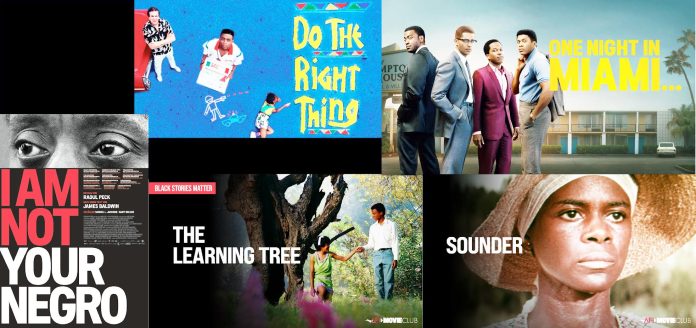
File photo
Jai’Den Smith
Staff Writer
Black History Month is coming to an end, but the appreciation, celebration, and honor of culture of African-Americans in the United States continues.
Over the years, BHM has evolved tremendously and it is important to recognize the challenges and struggles African-Americans faced throughout history and continue to face today.
One way to learn about the culture is through films. Films are not just for entertainment but they can be used to educate in large quantities. There have been many movies that have become staples in the African-American community.
Despite the impact of African-Americans in the film industry, there is a clear underrepresentation present in major roles.
UCLA Hollywood Diversity Reported in 2022 that the percentage of leading roles played by people of color in last year’s top 200 films has nearly quadrupled since 2011; that their share of writing credits has more than quadrupled; and that their percentage of directing jobs has nearly tripled.
The African-American Film Institute released a Black History Month Film Guide highlighting a list of films to celebrate black storytelling, from classics that heavily influenced their culture.
“The Learning Tree” (1969): Newt Winger (Kyle Johnson), an African-American teen in small-town Kansas in the 1920s, largely shrugs off the racial prejudice of his time and place. His calm and self-controlled perspective is in direct opposition to that of his quick-tempered friend, Marcus Savage (Alex Clarke). But when Marcus’ father, Booker (Richard Ward), murders a man, and Newt witnesses the crime, Newt realizes that going to the police could jeopardize both his friendship and his life.
“Sounder” (1972)” In this film, the Morgans, a family of poor black sharecroppers in the Depression Era South, struggle to find enough to eat despite the help of their hunting dog, Sounder. When Nathan (Paul Winfield), the father resorts to stealing food, he is captured by police and sent to prison, and his wife, Rebecca (Cicely Tyson), is left to care for their son, David (Kevin Hooks). Though Sounder has run away, David never gives up hope that his dog will return, just as he believes that he will see his father again someday.
“Do The Right Thing” (1989): Salvatore “Sal” Fragione (Danny Aiello) is the Italian owner of a pizzeria in Brooklyn. A neighborhood local, Buggin’ Out (Giancarlo Esposito), becomes upset when he sees that the pizzeria’s Wall of Fame exhibits only Italian actors. Buggin’ Out believes a pizzeria in a black neighborhood should showcase black actors, but Sal disagrees. The wall becomes a symbol of racism and hate to Buggin’ Out and to other people in the neighborhood, and tensions rise.
“I’m Not Your Negro” (2016): In 1979, James Baldwin wrote a letter to his literary agent describing his next project, “Remember This House.” The book was to be a revolutionary, personal account of the lives and assassinations of three of his close friends: Medgar Evers, Malcolm X and Martin Luther King, Jr. At the time of Baldwin’s death in 1987, he left behind only 30 completed pages of this manuscript. Filmmaker Raoul Peck envisions the book James Baldwin never finished.
“One Night in Miami” (2020): On the night of Feb. 25, 1964, in Miami, Cassius Clay joins Jim Brown, Sam Cooke and Malcom X, and they discuss the responsibility of being successful black men during the Civil Rights Movement.
Some Jackson State students shared some of their favorite black films they enjoy watching during BHM. Vivian Harrington, a junior early childhood education major from Charlotte, N.C., said her favorite film to watch is the “Black Panther”.
“Black Panther demonstrates that African-Americans have preserved numerous treasures that white people have attempted to eradicate,” stated Harrington.
Amani Dickenson, a junior chemistry major from Indianapolis, In., said that “Hidden Figures” is her favorite film to watch because it highlights the struggle of women from a different period of black history. She said that she felt an immediate connection with the characters because she is a chemistry major.
“It’s a favorite because I am a black woman pursuing my degree in chemistry. It just inspires me to keep pursuing my chemistry degree,” Dickenson said. “Maybe I’ll be able to make a huge impact like the black scientist before me.”
She added, “Despite their contribution to the success of NASA, their work was hardly recognized. They were overlooked by their white counterparts. Yet, they were the brains of the operation.”
Whether choosing to dive into nonfiction biopics of the lives of fearless black activists, or enjoying more comical films with moral underlining- all these films are a reflection of black culture and history.

